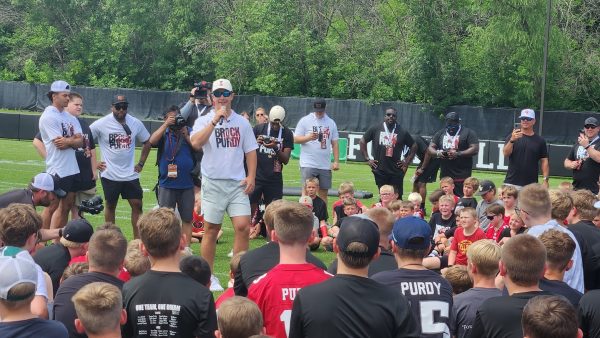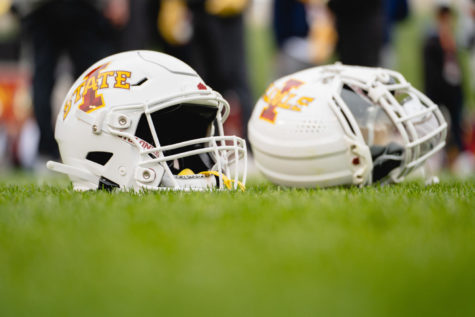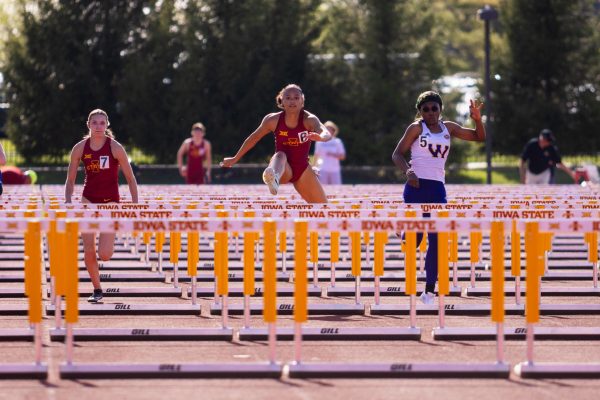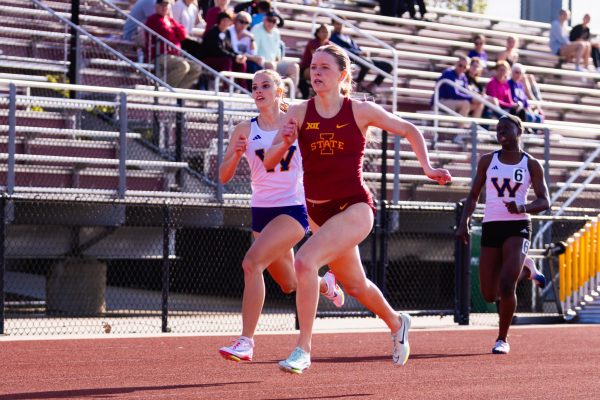Life as an Iowa State student-athlete requires time management, dedication
Photo: Rebekka Brown/Iowa State Daily
Kaeli Flaska, freshman in environmental science and a member of the soccer team, prints off notes for her statistics class Tuesday, Jan. 10, at Hixson-Lied Student Success Center. Time management is a skill that is vital for student-athletes to learn because of the time needed for both the sport and their studies.
January 10, 2012
Cutting 20 pounds in a week, waking up at 5:30 a.m. to run and studying for a psychology test while reviewing game film are typical demands for a Division I student-athlete.
“It is easy to underestimate the demands of a sport as a spectator because spectators only see players perform at games,” said senior Mary Kate McLaughlin, former captain of the ISU soccer team.
The responsibilities of a student-athlete exist on and off the playing field for McLaughlin, as well as wrestler Trent Weatherman and tennis player Ellie Nixon.
McLaughlin
McLaughlin, a 5-foot-10-inch defender, is a senior in psychology and Spanish. She finished her Cyclone soccer career in October. The West Des Moines, Iowa, native was a three-year captain for Iowa State and is coming to terms with the fact that she won’t compete at the Division I level again.
“I’m not ready to adjust to life without soccer because it’s all I’ve ever known for 18 years of my life,” McLaughlin said.
The end of her career has given McLaughlin the opportunity to reflect.
“Time management is one of the most important skills to master as a student-athlete at the collegiate level,” McLaughlin said. “Soccer is so demanding that when you’re not training, lifting, watching film, in meetings and at treatment, it’s important to be able to manage your time, especially in regard to school work.”
She said getting enough sleep — so you have energy to perform and function at a high level — is important.
“Being a student-athlete is both mentally and physically taxing, even more so when you’re dealing with an injury,” McLaughlin said. “It is important to set aside time for yourself so you don’t feel constantly overwhelmed.”
Building relationships with professors is crucial for student-athletes because of the amount of time spent on the road.
“It is critical to communicate with professors because we can miss up to seven class periods for every class that we are in,” McLaughlin said.
McLaughlin said traveling to compete is like a “business trip” because being on the road is no vacation.
“Individually, you need to take care of business by getting schoolwork done along with taking care of business on the field,” McLaughlin said.
Leadership is the key to any successful team, but it doesn’t come without accountability.
“A captain takes on a lot of responsibility on and off the field whether it’s in the classroom, social settings, team settings, practice, games, etc.,” McLaughlin said.
The coaches choose three captains every year based on whether the individuals display leadership in the classroom, community and on the field.
“You represent not only yourself as an Iowa State soccer player, but the team and program as well,” McLaughlin said.
McLaughlin said being a captain can be a “burden” as well.
“A leader is responsible for the actions of teammates, which can be tough at times because it can require setting aside friendships,” McLaughlin said. “Sometimes it feels like a burden or an extra weight on your shoulders, but it’s an honor to be trusted to lead a team and a privilege to be given that responsibility.”
The requirements of a student-athlete leave little time for a social life.
“Social relationships come last on the list of demands,” McLaughlin said. “The soccer team becomes family, but in the offseason you are able to make more time for friends.”
McLaughlin makes clear, though, that the only thing “off” about the offseason is not having as many games, and said that student-athletes “still train, sometimes more than we train during the regular season.”
The focus is geared toward fitness, improving individual performance and working on team chemistry by doing off-the-field activities to build continuity.
Money — and the ability to play at the professional level — are in the back of every collegiate student-athlete’s mind. Depending on circumstances, coaches have the ability to increase scholarships yearly, based on performance.
“Soccer is not an all-or-nothing sport, meaning players can be on any range of scholarship money along with academic money,” McLaughlin said. “Scholarships are important to consider when going through recruitment because each player has a unique financial situation.”
McLaughlin said she is “keeping the door open” to playing professionally in the U.S. or overseas.
Weatherman
Football and basketball rule the world of college sports, but at Iowa State, wrestling has a winning tradition. Weatherman, a redshirt sophomore from Ballard, Iowa, is a key contributor to the storied program.
Weatherman, a business management major, was ranked as the No. 1 wrestler in the nation coming out of high school in the 152-pound weight class. He decided to redshirt his freshman season and is glad he did.
“Redshirting gave me the opportunity to get a year of experience and to also improve my strength,” Weatherman said. “It’s a hard transition from high school to college wrestling, so my freshman year was more laid back by not having the mental grind of the season.”
The demands of a Division I wrestler often begin with “cutting weight.”
“This past summer I weighed 175 pounds, and I wrestle at 149 pounds,” Weatherman said. “Cutting weight is a process that takes a long time, so I had to shrink my body down by running a lot at the end of the summer, and then the last five to seven pounds is water weight.”
The differences between college and high school wrestling start with the length of the season.
“The season is really long and is demanding physically and mentally because you have to make weight every weekend, which is hard on your body,” Weatherman said. “If my weigh-in is at 2 p.m., I will have to weigh 149 pounds on the dot. In between the hour weigh-in and when I compete, I gain five to six pounds just by drinking water and eating an orange.”
Weatherman said that at the collegiate level, every wrestler he faces is good, so the preparation that goes into matches and meets is extremely important.
Weatherman said wrestling is more of a mental sport than physical when you’re competing at the highest level and planning ahead, and not leaving his homework for the end of the night is key.
A scholarship and Iowa State’s tradition enticed Weatherman to choose the Cyclones over other wrestling powerhouses. Weatherman said 9.9 scholarships are allotted at 10 weight classes with 20 walk-ons. Walk-ons don’t receive any athletic scholarship money to compete at the collegiate level. Coaches look at it as a “business deal,” watching how they spend their money on particular individuals.
“I was originally recruited by Cael Sanderson, arguably the greatest wrestler ever,” Weatherman said.
Sanderson, who went through his college career at Iowa State without losing a match, was another reason Weatherman selected Iowa State. When Sanderson left Iowa State for Penn State, Weatherman decided to stay and wrestle under coach Kevin Jackson.
One of the downfalls to being a Division I wrestler is missing holidays such as Thanksgiving and Christmas, along with Spring Break.
“We get five days off for Christmas break, and Spring Break is the same week as the national tournament,” Weatherman said.
If they go home over Winter Break, wrestlers still have to be cognizant of their weight.
“These are the types of sacrifices you have to make if you want to compete at an optimum level and become your best,” Weatherman said.
Lastly, Weatherman expressed his dream of wrestling in the Olympics.
“Depending on how the next three years go, I hope to be training for the 2016 Olympics,” Weatherman said.
He believes he is a better freestyle wrestler, which is the form used in Olympic competition.
Nixon
In a sport that provides eight full scholarships, Ellie Nixon plays Division I tennis for the love of the game. Nixon, a junior in accounting from Des Moines, was a preferred walk-on for the tennis team at Iowa State.
“I feel that being a walk-on makes me want to work even harder to show that I really want to belong on the team,” Nixon said.
Along with being a student-athlete, Nixon is a member of Kappa Kappa Gamma sorority.
“Being in a sorority is not as demanding as tennis, but the two can be hard to juggle,” Nixon said. “We have one meeting per week for Kappa, and I have to miss out on a lot of things going on in the house because of tennis.”
She said she doesn’t participate in many optional events because of the time commitment to tennis. Missing out socially, practicing early Saturday mornings and not having as much free time are all “part of the deal” with being a student-athlete.
“We don’t get a Spring Break, and summers are spent working on your game,” Nixon said.
Being an athlete in college is a “lifestyle.” She said having a job in the summer can be a struggle trying to balance working and practicing.
“I’ve learned what it’s like to be committed and to work hard with other people toward a common goal,” Nixon said. “We have so much going on that we’re tired all the time, so that can be mentally wearing.”
She said academic support, including tutors and mentors, is something a “normal” college student would have to pay for.
“The Iowa State tennis program has given me the opportunity to keep working hard at something I love to do and has provided me with connections for the future,” Nixon said.
The demands of a student-athlete are undeniable when competing at the Division I level, but a common theme among these contenders is the passion for the game.
“I was once told when you come to college to play a sport, you either learn to love it or hate it, as it becomes your everything for four years,” McLaughlin said. “I developed a love for the game, a deep desire and appreciation, and I will truly miss it.”

















